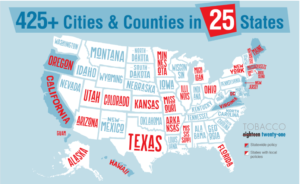
On February 21, 2019, Virginia Governor Ralph Northam signed into law HB 2748, which makes Virginia the 7th state to joint the “Tobacco 21” club, along with over 425 cities and counties around the country. Raising the minimum legal sales age for tobacco products to 21 has the potential to help greatly reduce smoking rates. A report by the Institute of Medicine suggests that smoking prevalence would drop by an additional 12% by 2100 if the minimum legal sales age were raised to 21 nationwide. However, the law that recently passed in Virginia focuses less on the legal age of sale for tobacco than on the legal age to purchase tobacco. While seeing tobacco control policies passed in states whose economies have historically relied on tobacco is normally cause to celebrate, many public health groups are not celebrating this policy as a real win, and for good reason (for example, read more about why American Cancer Society – Cancer Action Network did not support the bill). The law in Virginia presents a number of concerns:
- It maintains a purchase, use, and possession (PUP) provision that was included in Virginia’s previous youth access law. The evidence of the effectiveness of PUP provisions in reducing youth tobacco use is limited, particularly among those at higher risk for smoking, and the laws may have adverse consequences for youth already addicted, divert police resources, and open the door to inequitable enforcement against young people of color [1] In addition, focusing on the underage purchaser places the burden of responsibility on youth who have been victim to the tobacco industry’s relentless and often targeted marketing and who may already be addicted, rather than holding the retailer responsible for the products they sell. Learn more about PUP laws.
- It lacks enforcement strength. Creating strong Tobacco 21 laws is about more than crossing out 18 and writing 21. In order for these policies to be impactful, they must be adequately enforced. Best practices include having an articulated plan for enforcement with responsibility given to a single agency, requiring ongoing compliance checks, allocating funding for enforcement inspections, including high penalties (e.g. high fines, license suspension or revocation) for violators, and practicing merchant education. Learn more about this in Raising the Tobacco Sale Age to 21: Building Strong Enforcement into the Law. While there are fines included in the Virginia law for the underage purchaser and the clerk, there are no strong penalties for the retailer. Virginia is one of only about a dozen states that currently lack tobacco retailer licensing, which limits their ability to hold retailers accountable for tobacco control law violations.
- It has a stamp of approval from tobacco industry giant Altria and e-cigarette company Juul. Altria has publicly stated their support of Tobacco 21 policies, but what type of Tobacco 21 policies they support is important to look at critically. Tobacco companies have a history of throwing their support behind laws that sound good on the surface, but in reality are weak, unenforceable and/or preemptive. Learn more about Altria and Juul working to (successfully?) co-opt the Tobacco 21 movement from University of California San Francisco researcher Stanton Glantz.
- It includes an exemption for active-duty military personnel. Care should be taken to preserve military personnel’s freedom from addiction to tobacco. The tobacco industry has a long history of targeting the military, and some military leaders are now supportive of Tobacco 21 policies that include military personnel due to tobacco’s detrimental impact on military readiness. For more information see “Raising the Tobacco Sale Age to 21 and the Military” from the Campaign for Tobacco Free Kids. Virginia’s law is unfortunately not alone in this exemption; California’s policy also exempts active-duty military, and the American Lung Association’s State of Tobacco Control report gave the State of California a “B” instead of an “A” for their Tobacco 21 policy because of this.
Learn more about the “Tobacco 21” movement, the evidence behind the policy, and more resources on best practices visit our Tobacco 21 policy page.


